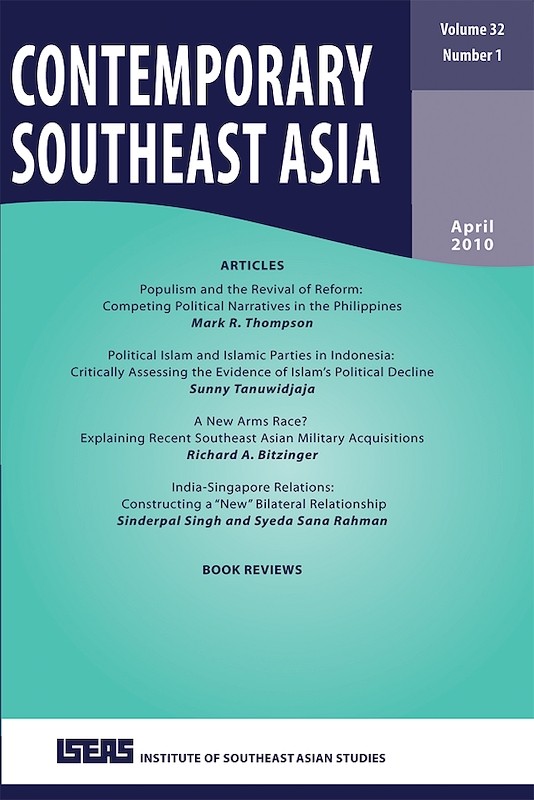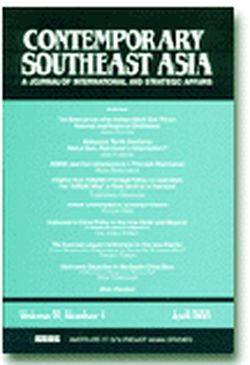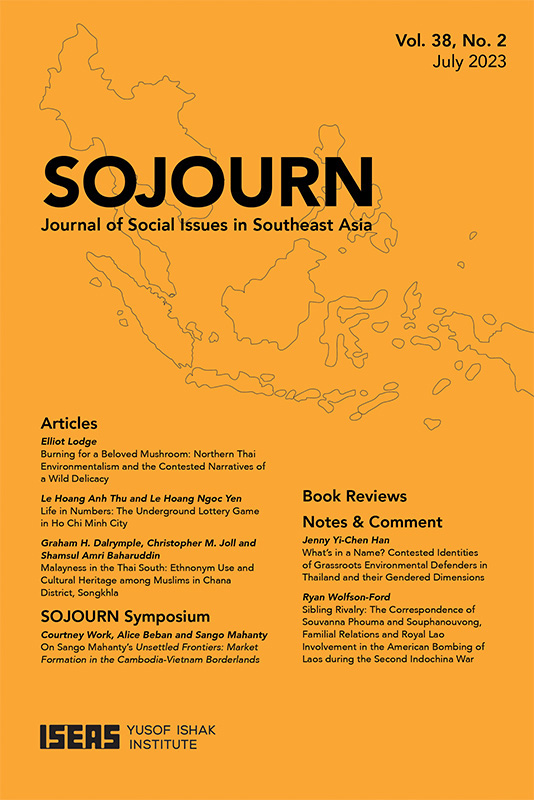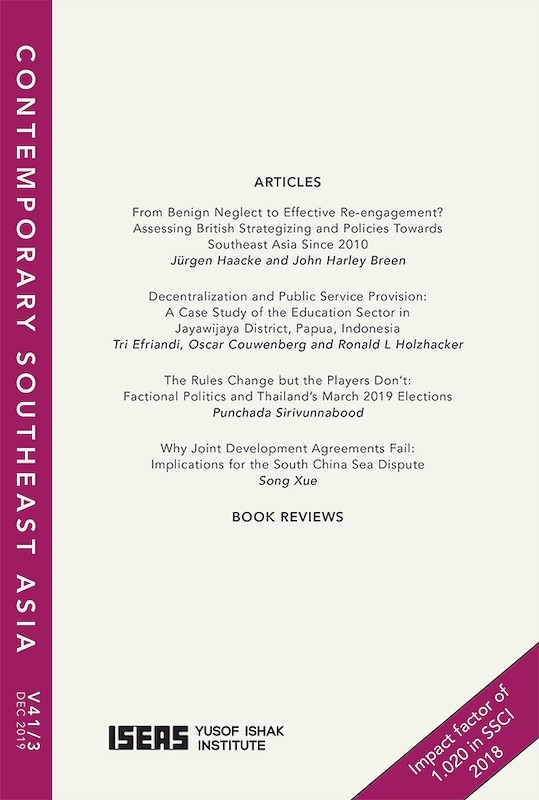Contemporary Southeast Asia Vol. 45/3 (December 2023)
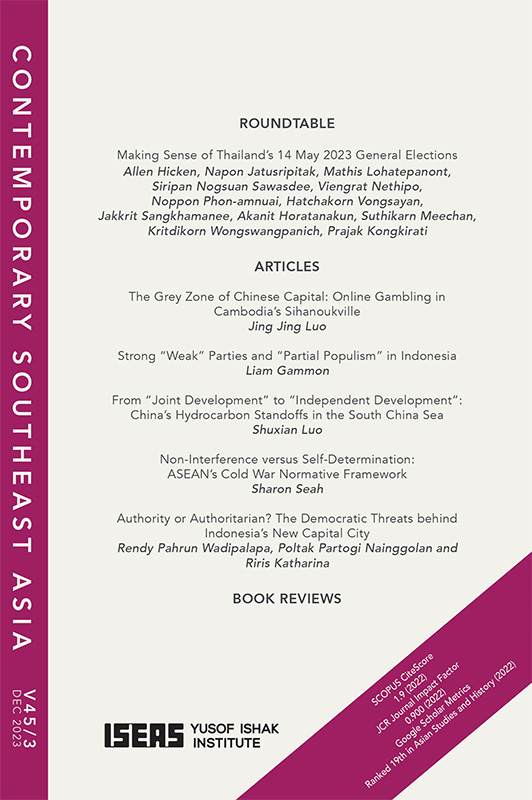
Date of publication:
December 2023
Publisher:
ISEAS – Yusof Ishak Institute
Number of pages:
228
Code:
CS45/3
Soft Cover
ISSN: 0129797X
Contents
-
Contemporary Southeast Asia Vol. 45/3 (December 2023)
[Whole Publication, ISSN: 1793284X] -
Preliminary pages
- ROUNDTABLE
-
1. Roundtable: Making Sense of Thailand’s 14 May 2023 General Elections, by Allen Hicken, Napon Jatusripitak, Mathis Lohatepanont, Siripan Nogsuan Sawasdee, Viengrat Nethipo, Noppon Phon-amnuai, Hatchakorn Vongsayan, Jakkrit Sangkhamanee, Akanit Horatanakun, Suthikarn Meechan, Kritdikorn Wongswangpanich, Prajak Kongkirati, authors
- ARTICLES
-
2. The Grey Zone of Chinese Capital: Online Gambling in Cambodia’s Sihanoukville, by Jing Jing Luo, author see abstractBetween 2016 and 2019, the online gambling industry in Cambodia grew from obscurity to become the largest in Southeast Asia, capturing news headlines worldwide. Focusing primarily on the adverse impacts of this phenomenon, especially surging crime rates and discontent among local Cambodians, these reports often failed to provide a meaningful understanding of the complex factors and actors behind the industry. With little systematic scholarly research on the topic, this article seeks to fill the gap. Utilizing data from fieldwork in Cambodia and China, it examines the drivers of Chinese investment in Cambodia’s gambling industry, from its openness to foreign capital and weak governance to crackdowns in other gambling hubs like the Philippines and Macau. It further offers an ethnographic discussion of Chinese online gambling operations in Cambodia and their impacts on both Cambodian and Chinese societies. Additionally, it considers the implications of the Cambodian government’s crackdown on online gambling in 2019 and the COVID-19 pandemic on China-Cambodia relations.
-
3. Strong “Weak” Parties and “Partial Populism” in Indonesia, by Liam Gammon, author see abstractThe viability of populism—a political strategy used by charismatic politicians to forge highly personalistic ties with voters—is preconditioned on the alienation of voters from non-populist, patronagebased or identity-based parties. In Indonesia, a collapse in the ties between voters and such parties has opened up strategic space for charismatic political entrepreneurs to make personalistic appeals to atomized voters through the media, without relying on the organizational infrastructure of political parties to connect them to grassroots politics. Since the introduction of direct presidential elections in 2004, the mobilization of party infrastructures has become increasingly irrelevant to a candidate’s chances of success, with media-based populism now the default mode of electioneering. However, constantly changing electoral rules have made it increasingly difficult to register a new political party and for that party to nominate a presidential candidate. As a result, populist presidential candidates have been forced to enter into pre-election coalitions with existing parties as a condition of running for president. This article argues that electoral rules have therefore played a crucial role in sustaining the systemic importance of political parties within Indonesia’s presidential democracy despite the weak bonds between parties and voters, thus ensuring the cooperation of presidents with party bosses.
-
4. From “Joint Development” to “Independent Development”: China’s Hydrocarbon Standoffs in the South China Sea, by Shuxian Luo , author see abstractSome of Beijing’s recent assertive actions in the South China Sea can be understood as a manifestation of what Chinese analysts call “independent development”. The concept is conceived as a responsive measure to what Beijing views as other claimants’ unilateral hydrocarbon development activities in the South China Sea and as a means to pressure other claimants into engaging in joint development with China and to compensate for what Beijing perceives as the disadvantages it faces being a latecomer to the energy development race in the region. In attempting to conduct independent development, China has mostly targeted areas of the South China Sea that overlap with Vietnam’s designated oil and gas development blocks. By contrast, when dealing with the Philippines, especially during the presidency of Rodrigo Duterte (2016–22), China has adopted the more loosely defined concept of “cooperative development” to minimize potential legal and political barriers that Philippine leaders may face domestically. With Malaysia, China has traditionally been ambivalent to the prospect of joint development but may increasingly utilize independent development to nudge Malaysia into starting a serious discussion on joint development. However, pursuing independent development does not portend China’s abandonment of joint or cooperative development. Indeed, there remains hope for regional collaboration in hydrocarbon development in the South China Sea.
-
5. Non-Interference versus Self-Determination: ASEAN’s Cold War Normative Framework, by Sharon Seah, author see abstractUsing the Indonesian annexation of East Timor in 1975 and Vietnam’s occupation of Cambodia between 1978 and 1989 as case studies, this article examines how ASEAN understood the principles of nonintervention and non-interference as juxtaposed against the right to self-determination in the 1970s. As ASEAN’s first “crises” in its formative years, they illustrate how the bloc’s initial norm-making processes evolved as individual member states attempted to make their case for or against intervention. The article contends that ASEAN’s principles of non-intervention and non-interference are non-static and adaptive. It also suggests that while ASEAN’s normative framework may have been sufficiently accommodative of its members’ different standards and approaches towards protecting sovereignty, the right to self-determination and independence in the past, it is questionable whether the adherence to non-interference would be sufficient for the grouping to address the present crisis in Myanmar and future challenges.
-
6. Authority or Authoritarian? The Democratic Threats behind Indonesia’s New Capital City, by Rendy Pahrun Wadipalapa, Poltak Partogi Nainggolan, Riris Katharina, authors see abstractThe relocation of Indonesia’s capital from Jakarta to Nusantara Capital City in East Kalimantan will have significant implications for democratic rights and governance. However, this issue has been overlooked in most studies. Using interviews with politicians, bureaucrats and analysts, as well as focus group discussions and field observations, this article highlights various concerns surrounding the legal and administrative process of creating a new capital, including the rapid drafting of the relocation legislation, public opposition to the Nusantara Capital City Authority, the absence of local representation and the centralization of decision-making. All of this, the article contends, poses a threat to democracy in Indonesia.
- BOOK REVIEWS
-
BOOK REVIEW: Famine in Cambodia: Geopolitics, Biopolitics, Necropolitics, by James A. Tyner, by David Hutt, author
-
BOOK REVIEW: Indonesia at the Crossroads: Transformation and Challenges., edited by Okamoto Masaaki and Jafar Suryomenggolo, by Iwan S Anugrah, author
-
BOOK REVIEW: Managing Great Power Politics: ASEAN, Institutional Strategy, and the South China Sea, by Kei Koga, by Blake Herzinger, author
-
BOOK REVIEW: Stalemate: Autonomy and Insurgency on the China-Myanmar Border, by Andrew Ong, by Amara Thiha, author
-
BOOK REVIEW: Electoral Reform and Democracy in Malaysia, edited by Helen Ting M.H. and Donald L. Horowitz, by Hwok-Aun Lee, author

